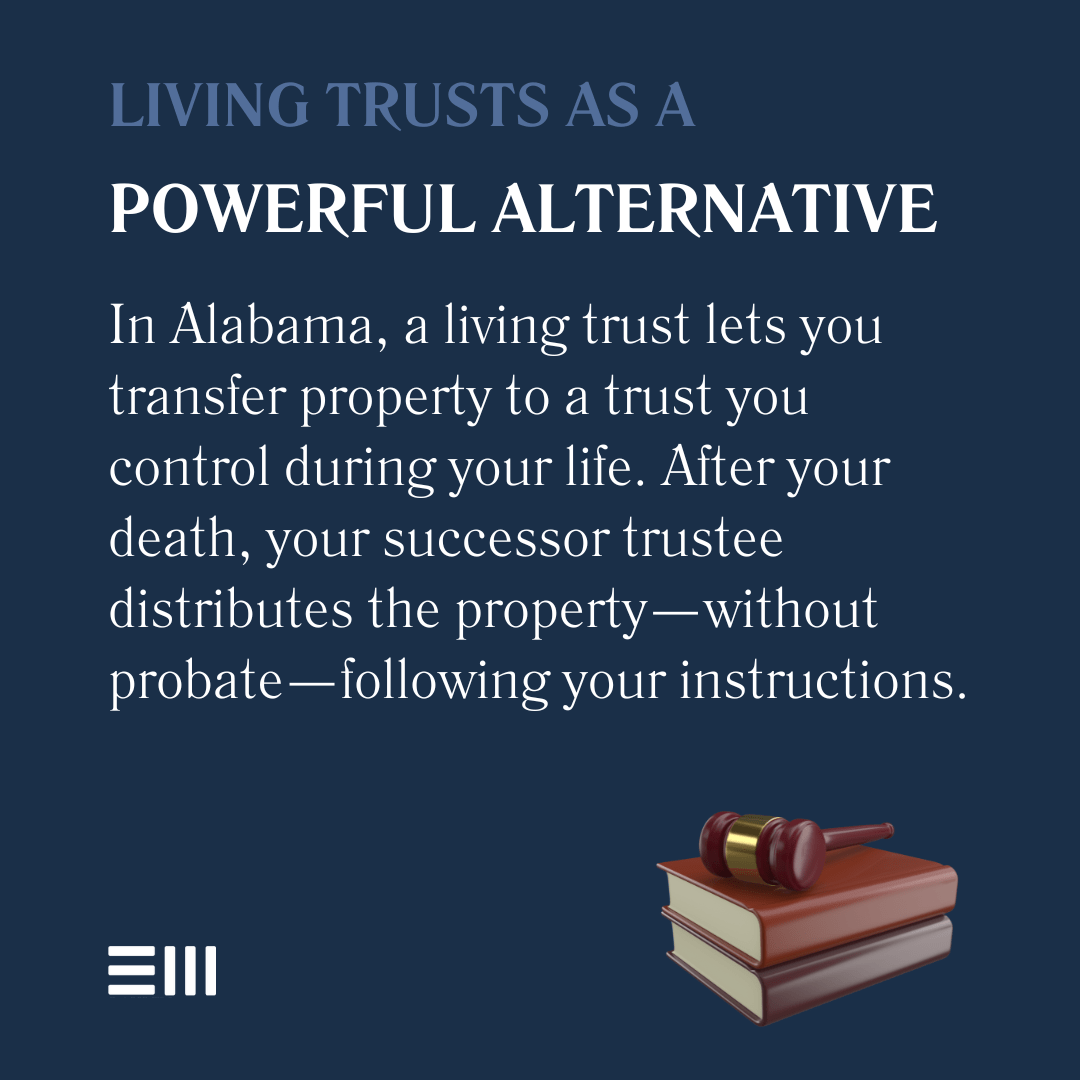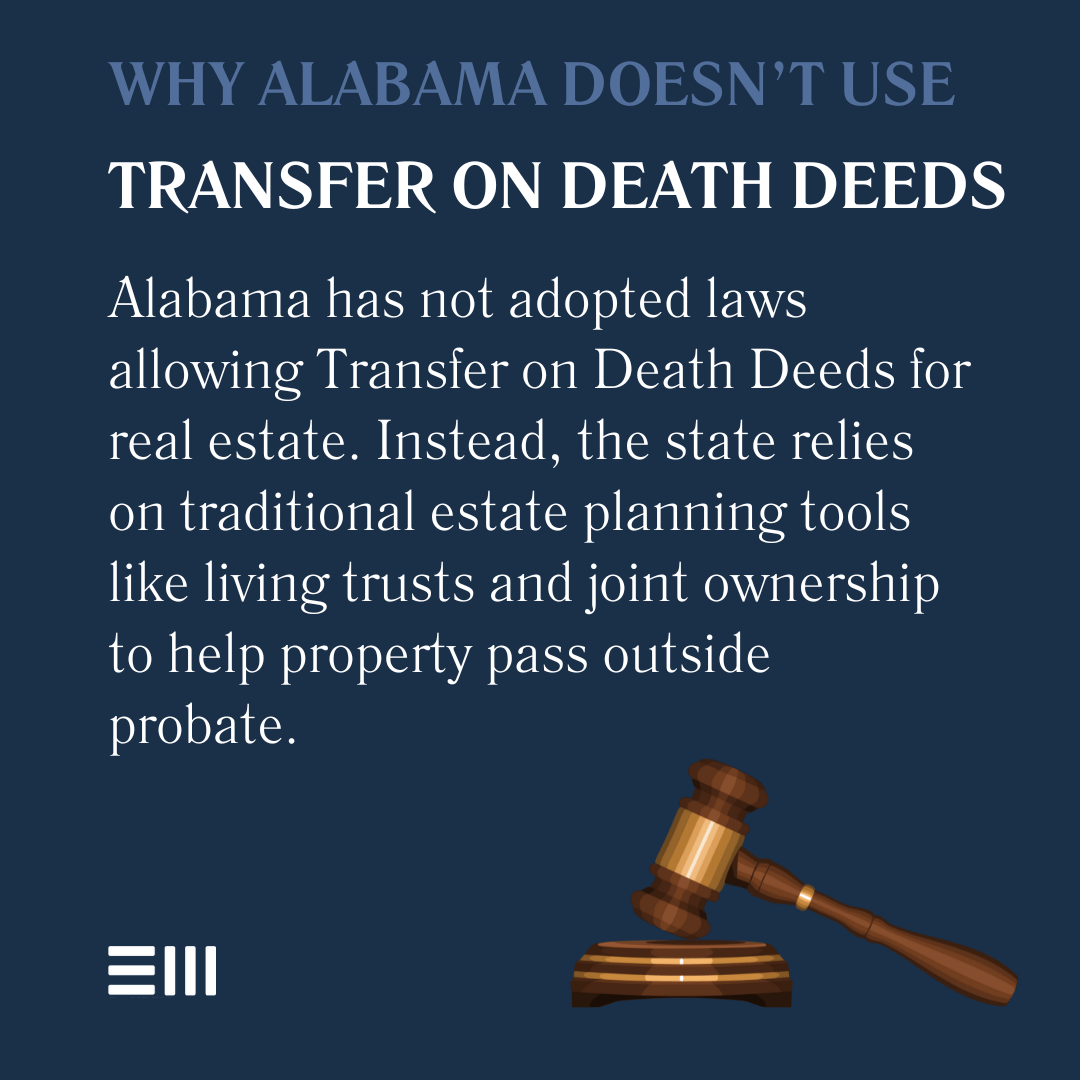Transfer on Death Deeds are not available in Alabama. Alabama has not adopted legislation allowing Transfer on Death Deeds for real estate.
If you're an Alabama property owner looking for ways to avoid probate and transfer real estate to your beneficiaries efficiently, you'll need to use other established legal methods that are available under Alabama law.
Alabama estate planning operates under different legal frameworks that offer effective approaches to achieve similar goals of probate avoidance and efficient property transfer.
Effective Alabama Estate Planning Options
While Alabama doesn't offer Transfer on Death Deeds, several established legal alternatives can help you avoid probate and transfer real estate to your chosen beneficiaries.
Living Trusts
A revocable living trust is one of the most effective alternatives to Transfer on Death Deeds in Alabama. When you create a living trust and transfer your property into it, the trust becomes the legal owner of the property while you maintain complete control as the trustee during your lifetime.
Upon your death, the successor trustee you've named can transfer the property directly to your beneficiaries without probate court involvement.
Living trusts offer flexibility, privacy, and the ability to provide detailed instructions for property management and distribution.
Joint Ownership with Rights of Survivorship
Alabama recognizes joint ownership arrangements that automatically transfer property to surviving owners upon death. When property is held as "joint tenants with rights of survivorship" or "tenants by the entirety" (for married couples), the surviving owner(s) automatically receive full ownership without probate proceedings.
This method works particularly well for spouses or close family members who want immediate, automatic transfer upon death. However, it does create immediate ownership interests for all parties, which may not be suitable for every situation.
Enhanced Life Estate Deeds (Lady Bird Deeds)
Alabama recognizes enhanced life estate deeds, sometimes called "Lady Bird Deeds," which allow property owners to retain complete control during their lifetime while designating remainder beneficiaries who receive the property automatically upon death.
Unlike traditional life estate deeds, enhanced life estate deeds allow the owner to sell, mortgage, or modify the property without beneficiary consent. This provides flexibility similar to what Transfer on Death Deeds would offer in other states.
Beneficiary Deeds for Personal Property
While Alabama doesn't allow Transfer on Death Deeds for real estate, the state does permit beneficiary designations for certain types of personal property, including bank accounts, retirement accounts, and life insurance policies. These designations allow assets to pass directly to beneficiaries without probate.
Traditional Probate vs. Alabama's Simplified Procedures
When probate cannot be avoided, Alabama offers simplified probate procedures for smaller estates that can reduce time and costs compared to full probate proceedings.
Understanding these options helps families choose the most appropriate approach for their circumstances.
Small Estate Affidavit Process
For estates valued under $25,000 (excluding homestead property), Alabama allows a simplified small estate affidavit process that can transfer assets without formal probate proceedings. This streamlined procedure can be completed in weeks rather than months.
Summary Administration
Alabama's summary administration process provides simplified probate procedures for certain estates, reducing time and complexity compared to full probate proceedings while still ensuring proper legal transfer of assets.
Professional Estate Planning in Alabama
Given Alabama's specific estate planning laws and the absence of Transfer on Death Deeds, working with experienced Alabama estate planning attorneys is crucial for developing effective strategies that actually work under state law.
Our attorneys can help you evaluate your options and choose the most appropriate methods for your specific circumstances, whether that involves living trusts, joint ownership arrangements, enhanced life estate deeds, or other established legal strategies.
Learn more about choosing an estate planning attorney and the benefits of estate planning in Alabama.
Important Considerations in Alabama Estate Planning
Understanding Alabama's specific estate planning laws and available options is crucial for developing effective strategies that work under state law.
Using Appropriate Legal Tools
Alabama residents should focus on estate planning methods that are recognized and validated under state law. Working with experienced Alabama estate planning attorneys ensures your chosen strategies will effectively accomplish your goals.
DIY Estate Planning Without Legal Guidance
Alabama's estate planning laws have specific requirements and nuances that require professional knowledge to navigate effectively.
Attempting to create estate planning documents without proper legal guidance can result in invalid documents or unintended consequences.
Read more about what to know about estate planning in Alabama.
Failing to Update Estate Plans
Estate planning documents should be reviewed and updated regularly to reflect changes in family circumstances, financial situations, and Alabama law. Outdated plans may not accomplish your current objectives.
Consider reviewing our estate planning checklist for comprehensive guidance.
Frequently Asked Questions About Alabama Estate Planning Alternatives
Understanding your options for estate planning in Alabama often raises common questions about available alternatives to Transfer on Death Deeds.
Why doesn't Alabama have Transfer on Death Deeds?
Alabama simply hasn't adopted this relatively recent estate planning innovation. The state relies on traditional methods like trusts, joint ownership, and enhanced life estate deeds to accomplish similar goals.
Are Lady Bird Deeds the same as Transfer on Death Deeds?
Enhanced life estate deeds (Lady Bird Deeds) provide similar benefits to Transfer on Death Deeds, allowing property owners to maintain control during their lifetime while ensuring automatic transfer to beneficiaries upon death.
Can I avoid probate entirely in Alabama?
Yes, through proper estate planning using living trusts, joint ownership, or enhanced life estate deeds, you can avoid probate for most or all of your assets.
Learn more about the role of an estate executor if probate becomes necessary.
What's the best alternative to Transfer on Death Deeds in Alabama?
The best alternative depends on your specific circumstances. Living trusts offer the most flexibility and control, while joint ownership provides simplicity for smaller estates or specific relationships.
Our attorneys can help you determine the best approach based on your needs.
How much does it cost to set up probate alternatives in Alabama?
Costs vary depending on the complexity of your estate and chosen methods. While there are upfront costs for proper estate planning, these typically represent significant savings compared to probate expenses.
Consider our guidance for estate planning for young families or high-net-worth individuals based on your situation.
Secure Your Property's Future Today
Alabama offers several established methods that can effectively transfer your property to your chosen beneficiaries while avoiding probate complications.
The experienced estate planning attorneys at Baxley Maniscalco understand Alabama's specific laws and can help you choose the most appropriate strategies for your circumstances. We'll ensure your estate plan uses valid legal tools that work under Alabama law.
Contact our skilled estate planning team today to discuss living trusts, enhanced life estate deeds, joint ownership arrangements, and other established methods for protecting your property and providing for your beneficiaries. You can also review our legal resources for additional guidance on estate planning matters.
Let us help you create an effective estate plan using Alabama's legal framework to secure your family's future.


